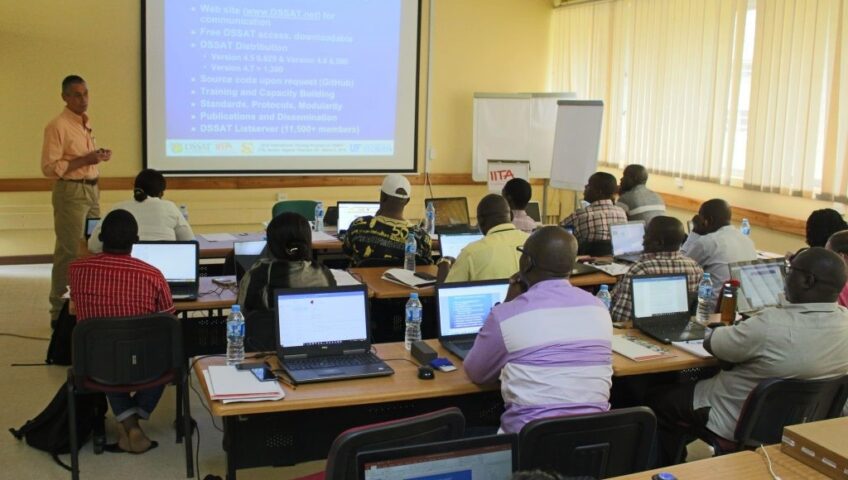Scientists working with the IITA-managed African Cassava Agronomy Initiative (ACAI) project have made significant advancements in crop modelling to improve the yield predictions underlying the AKILIMO decision support tools. The team is evaluating the performance of the Light Interception and Utilization (LINTUL) and Decision Support System for Agrotechnology Transfer (DSSAT) to predict the attainable yield of cassava in well-managed agronomic field trials.
The scientists are drawn from the International Institute of Tropical Agriculture (IITA), Wageningen University (WUR), University of Florida (UF) and the African Plant Nutrition Institute (APNI). They are part of the ACAI team that has been developing AKILIMO decision support tools using field research data and simulation models to create a robust prediction engine that provides site-specific recommendations for cassava agronomy.
Both LINTUL and DSSAT are designed to predict crop growth and yields as affected by genotype, soil and daily and seasonal climate variations in temperature, solar radiation and rainfall. However, DSSAT is more data-intensive by simulating in great details dry matter allocation to different plant organs as compared with a simpler mechanism based on dry matter partitioning used in LINTUL. So far, LINTUL has been used to predict water-limited yield used in the AKILIMO prediction engine together with GIS data to provide recommendations. Predictions using DSSAT are expected to be more robust and precise, and also integrate a conversion of dry to fresh matter, which is important to quantify revenue, as farmers either sell their produce on the fresh root market, or to starch factories and disaggregate prices based on starch content.
The team held a virtual workshop in June to evaluate the performance of the two models using all geospatial and crop data gathered over the past 4 years of project implementation. Given the different parameterization, the two models could perform differently under varying agro-ecological conditions.
According to ACAI and IITA Data Scientist Meklit Chernet, it is important to understand the strengths and the limitations of the two models to improve the prediction of AKILIMO decision support tools.
The team is currently calibrating and investigating the models using the field data collected by ACAI in order to perform a side-by-side comparison. Based on this outcome, simulations will be run across 20 years of historical weather data and the intervention areas in Nigeria and Tanzania, which will be integrated in the back-end of AKILIMO, and permit not only better yield predictions, but also measures of uncertainty or risk to better inform the users of AKILIMO.
Source: AKILIMO UPDATES

